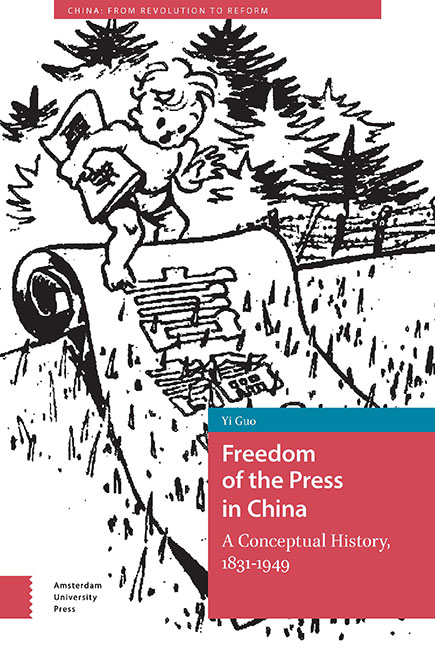Book contents
- Frontmater
- Contents
- A Note on Romanization
- Acknowledgements
- Foreword
- Introduction
- 1 The Enlightenment of the West
- 2 Chuban Ziyou: The Invention of a Neologism
- 3 The Liminal Landscape
- 4 The Intellectual Legacy of Sun Yat-sen
- 5 The Empty Phrase and Popular Ignorance
- 6 Conceptual Debates in the 1920s and 1930s
- 7 The Last Call for Press Freedom
- Conclusion
- Bibliography
- Index
- Frontmater
- Contents
- A Note on Romanization
- Acknowledgements
- Foreword
- Introduction
- 1 The Enlightenment of the West
- 2 Chuban Ziyou: The Invention of a Neologism
- 3 The Liminal Landscape
- 4 The Intellectual Legacy of Sun Yat-sen
- 5 The Empty Phrase and Popular Ignorance
- 6 Conceptual Debates in the 1920s and 1930s
- 7 The Last Call for Press Freedom
- Conclusion
- Bibliography
- Index
Summary
Abstract
Observers of the media landscape in China often express the criticism that individual speech still suffers from arbitrary restriction and that mass media is run in an ‘authoritarian mode.’ Yet how did the state of press freedom in China end up like this? Was this an inevitable outcome, or are there historical antecedents that predate the communist system? To answer these questions, we need to conduct a comprehensive inquiry into China's history of press freedom because today's conception of press freedom is fundamentally related to its past. In the case of China, this conceptual history has so far received little attention. This chapter delineates theoretical backgrounds and methodological issues relating to the conceptual history of press freedom in China.
Keywords: liberalism, democracy, structure of feeling, freedom of speech, Asian values, transnational history
‘Democracy and free speech should be taken for granted. Democracy and freedom are the fresh air that is worth fighting for.’ When the outspoken Chinese graduate Shuping Yang delivered her graduation speech at the University of Maryland in the United States on 21 May 2017 – arguing that in China, ‘only authorities owned the narrative’ and praising the U.S. for ‘the fresh air of free speech’ – she might not have anticipated the extent to which her ‘politically incorrect’ speech would draw such harsh critique from many Chinese students in America and social media users in China. They considered her speech as pandering to America and as ‘insulting China’. One such person commented in fury: ‘Don't let me meet you in the United States; I am afraid I could not stop myself from going up and smacking you in the face.’
Is the reputation of the nation more valuable than freedom of speech? As the BBC's China expert Carrie Gracie commented, Shuping Yang's case ‘highlighted a conflict between a commitment to free speech in Western countries that host large communities of Chinese students and the growing determination of the Chinese government and some of its citizens that free speech should be limited when it comes to talking about China, even beyond Chinese borders’.
- Type
- Chapter
- Information
- Freedom of the Press in ChinaA Conceptual History, 1831–1949, pp. 15 - 38Publisher: Amsterdam University PressPrint publication year: 2020



